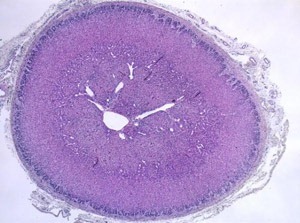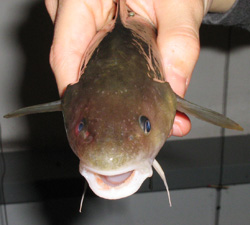Persistent organic pollutants’ influence on cortisol synthesis examined
0
Cross section of an adrenal gland from a sheep fetus. Exposure to PCB through fetal life caused changes in adrenal cortex thickness and its ability to produce the stress hormone cortisol.
Persistent organic pollutants are best known for the influences they can have on sex hormones. But new research from Karin Zimmer at the Norwegian School of Veterinary Science investigates how these substances can also influence the adrenal cortex, which mediates stress responses.
Zimmer’s research shows that persistent organic pollutants, such as polychlorinated biphenyls, can influence the adrenal cortex’s production of cortisol, a stress hormone that plays a crucial role in normal fetal development and helping the body function normally during stressful events.
Her PhD thesis, “Persistent organic pollutants as endocrine disruptors: effects on adrenal development and steroidogenesis,” shows that exposure to PCBs and other POPs during fetal stages and the suckling period cause altered cortisol levels in the blood of both fetuses and adult animals, which suggests that exposure during these early development stages could have lasting consequences for humans, aquatic life, and other animals.
POPs are widespread in the environment and are regularly consumed by humans and animals. There has been a recent focus on these pollutants’ abilities to disrupt normal functioning of endocrine systems.
Polychlorinated biphenyls, or PCBs, are man-made chemicals classified as POPs that were once used in hundreds of industrial and commercial applications, but their manufacture was banned in the U.S. in 1979.
However, factories, chemical manufacturers, and municipal wastewater treatment plants had been had been discharging PCBs into waterways for decades. PCBs have settled into the sediment of many surface waters, where they are consumed by bottom-dwelling aquatic life and then move up the food chain.
The altered cortisol balance during early life caused by consumption of PCBs and other POPs could increase the likelihood of developing several diseases in adulthood, according to Zimmer.
Zimmer used human hormone-producing cells and exposed them to various environmental mixtures of POPs extracted from fish. She found that a POP mixture extracted from crude, unprocessed cod liver, for instance, had a pronounced affect on the synthesis of cortisol and sex hormones, whereas a mixture from processed, commercial cod liver oil, which is frequently consumed as a dietary supplement, was shown to have only limited effects.
Her thesis concludes that cortisol synthesis seems to be a sensitive target for POPs and further research into the degree this can jeopardize human and animal health is necessary.
Persistent organic pollutants affect the stress hormone cortisol [The Norwegian School of Veterinary Science] Image Credit: The Norwegian School of Veterinary Science












